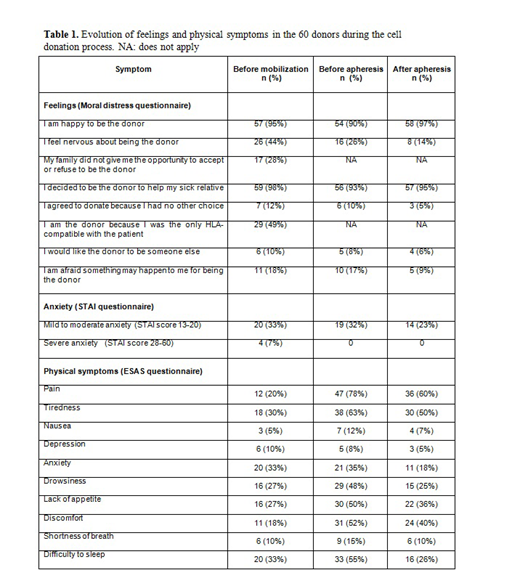Introduction. Hematopoietic stem cell donors (HSCD) frequently suffer from anxiety and feelings that are usually unnoticed by the physician o their relatives. The origin is multifactorial: fear of pain, fear of the procedure, adverse effects of growth factor, feelings of responsibility regarding the success of the transplant, family pressure, etc. HSCD could show ambivalence of feelings about the donation, which may be related to the moral obligation to help a sick relative and fear of the donation procedure, thus originating anxiety and moral distress (MD). We evaluated the incidence of MD, anxiety, and other symptoms in a group of HSCD regarding donor related allogeneic transplantation.
Materials and methods.
A prospective observational study was carried out through a survey applied to 60 consecutive HSCD from April, 2014 to January, 2017. Protocol was approved by Institutional Ethics Review Committee and was carried out according to the Declaration of Helsinki. HSCD completed 3 written self-answered questionnaires (Questionnaire to assess moral distress (MDQ) elaborated by the researcher, State Trait Anxiety Index (STAI®) and Edmonton Symptom Assessment System (ESAS)) in three stages: right before initiating stem cell mobilization, immediately before the apheresis procedure, and 24 hours after the donation. Cell mobilization was done with granulocyte colony-stimulating factor (G-CSF) 10 µg/kg/day/4 days while the apheresis collection was performed on the fifth day as an outpatient basis in all cases.
Results.
Sixty donors, 36 male and 24 female with a mean age of 38.2 years (SD = 13.6) were included. HSCD was a brother/sister of the patient in 39 cases (65%), and one parent in 21 cases. Regarding donor educational level, only 24 (40%) donors had university level.
MDQ: Most donors felt happy to be the donor (97%), but 28% said they were not given the opportunity to accept or refuse being the donor, 10% would have preferred that another person had been the donor, and 5% mentioned that donation worsened their family relationship and they would not donate cells again if necessary. The number of donors with negative feelings regarding the donation decreased through the 3MD questionnaires (Table 1).
STAI: In the first, second, and third questionnaire, the mean score for the state of anxiety was 12.1 (SD = 7.6), 10.3 (SD = 6.6), and 7.9 (SD = 5.7), respectively. In first STAI, mild to moderate anxiety was observed in 33% of the donors and severe anxiety was observed in 7%, observing a higher score in the first questionnaire, just before starting cell mobilization; however, that score gradually decreased in the following questionnaires.
ESAS: In the first questionnaire, although no procedure was still performed, all donors had symptoms, including insomnia (33%), anxiety (33%), and tiredness (30%). In the second ESAS questionnaire, symptoms worsened, mainly pain (78%), tiredness (63%), and insomnia (55%), which was probably related to G-CSF. In the third ESAS questionnaire, there was a significant decrease in the symptoms: pain (60%), tiredness (50%), and discomfort (40%). The average global score for 10 symptoms evaluated was 10.5 (SD = 14.2), 20.1 (SD = 16.0), and 12.3 (SD = 14.4) for the first, second, and third ESAS questionnaires, respectively. According to the score given to each symptom, the most frequent disabling symptoms in each questionnaire were hyporexia (10%), pain (23%), and discomfort (15%) in ESAS questionnaire 1, 2, and 3, respectively.
Higher scores for MD correlated with higher scores in STAI questionnaires as well as with lower levels of education (r=0.456, p< .005).
Conclusions
MD in the donor can manifest both clinically and socially through insomnia, fatigue, loss of appetite, anxiety, and ambivalence of feelings (happy to be the donor but feel morally obligated to donate) which may affect family relationships. Although there is no instrument to measure the MD before performing any procedure in the present study, the donors had different symptoms, such as negative feelings, anxiety, tiredness, difficulty to sleep, and even pain; all of them without an apparent physical reason. It is desirable that donors receive bioethical counseling and psychological guidance before the donation process in order to provide them with the necessary information regarding the experience they are about to endure.
Gomez-Almaguer:Amgen: Consultancy, Speakers Bureau; Teva: Consultancy, Speakers Bureau; Janssen: Consultancy, Speakers Bureau; Takeda: Consultancy, Speakers Bureau; Celgene: Consultancy, Speakers Bureau.
Author notes
Asterisk with author names denotes non-ASH members.


This feature is available to Subscribers Only
Sign In or Create an Account Close Modal